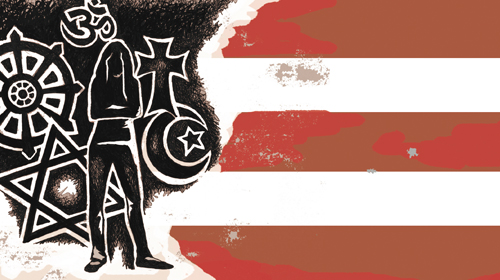
Yesterday Peter King (R-NY), Chair of the House Homeland Security Committee, brought congressional navel gazing to a new level by holding a hearing on his past hearings that have singled out and perpetuated dangerous stereotypes about the American Muslim community. As advertised, the hearing‚ÄĒwhich may have been the first ever of its kind‚ÄĒfocused not on how Congress could make the homeland more secure or on the nature and scope of real security threats, but on whether King‚Äôs own past hearings were justified.
In pondering the meta nature of this unusual exercise Mother Jones‚Äô rightly wondered ‚ÄúWhat's next? A hearing on the Muslim community's response to the hearing on the earlier hearings?‚ÄĚ
Many members of the committee were equally puzzled and publically questioned whether having a hearing about past hearings was a good use of the committee‚Äôs resources‚ÄĒRep. Hansen Clarke (D-MI) noted that he would rather spend time discussing how to protect the water sources of his constituents. Many taxpayers likely share Clarke‚Äôs view that self-referential pondering is pretty low on their list of what their elected officials in Washington need to tackle.
Indeed, King’s series of hearings was never intended to seriously examine real threats to our national security or the empirical evidence about law enforcement approaches that make us safer. The hearings have, instead, served as a megaphone to propagate counterproductive anti-Muslim rhetoric based on stereotypes. Hence, King’s irritation when minority witness of New York University’s Brennan Center for Justice kept coming back to the facts: all empirical studies demonstrate that the propensity to commit violence cannot be predicted by how religious someone is or the ideology he or she holds..
King may have been able to dig up three people to testify in support of his crusade, but he also provoked broad-based opposition to the hearing‚Äôs frame. Fifty-five Muslim, Arab, Middle Eastern and South Asian organizations from across the country sent a letter to the committee calling the hearing an ‚Äúirresponsible attack on American Muslims.‚ÄĚ Forty religious, secular, and interfaith groups also weighed in, urging King to discontinue the hearings series that ‚Äúundermines fundamental American values, erodes trust, and fuels divisiveness by casting suspicion over an entire community.‚ÄĚ
The premise of yesterday‚Äôs hearing was absurd and outlandish. And the answer to the question, ‚ÄúDoes a hearing about hearings make those hearings any more legitimate?‚ÄĚ, is, predictably, ‚ÄúNo.‚ÄĚ Let‚Äôs hope King doesn‚Äôt try again and suggest a hearing on the hearing on the hearings.
Learn more about discrimination: Sign up for breaking news alerts, , and .

